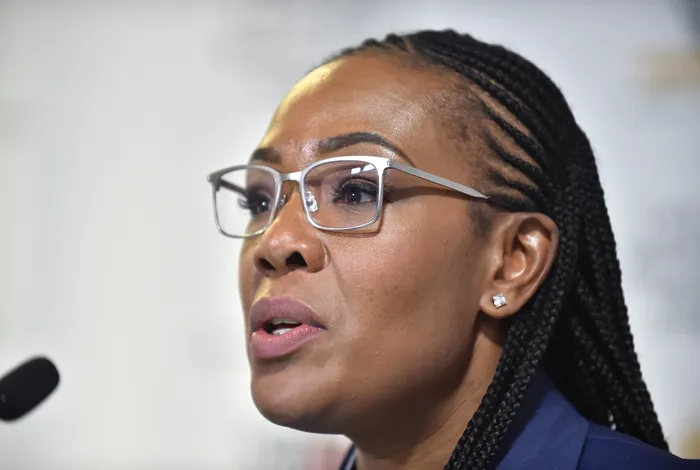
Auditor-General Tsakani Maluleke's audit report raises cocerns in KZN
Image: Thobile Mathonsi / Independent Newspapers
KwaZulu-Natal government departments are facing increased financial risk, with regressive audit opinions becoming commonplace.
The dire warning was made by the Auditor General of South Africa, Tsakani Maluleke, following the audit report for the 2024-2025 financial year, examining government departments and entities in KZN.
The report showed a regression in the audit outcomes, revealing that government departments and entities are struggling. However, it noted that the Department of Agriculture had improved its findings to achieve a clean audit. Six departments and entities had not made progress towards a clean audit, while the Department of Cooperative Governance and Traditional Affairs has regressed to unqualified with findings.
The Department of Health moved to qualified with findings. Three audit reports from various entities remain outstanding. The report shocked members of the legislature, who argued that it painted a worrying picture, especially regarding finances.
The AGSA report highlighted the increased pressure on government finances and called for careful action to mitigate against a financial crisis. “The financial health of the province remains in a precarious position, calling for greater austerity measures and discipline in how the funds are handled,” it stated.
The report indicated that rising fiscal risks undermine service delivery. “Escalating claims against the state have reached R15 billion, largely concentrated in Transport, totalling R9.5 billion, Health at R3.6 billion, and Education at R1.6 billion.
With Education and Transport not budgeting for these liabilities, claim settlements will eventually divert funds away from service delivery, placing pressure on already constrained budgets,” the report warned.
It noted severe cash flow fragility in the province. “Five departments are dependent on overdrafts to sustain their operations, and an additional ten departments experience cash shortfalls that will roll over to the next budget cycle. While three departments have already consumed more than 10% of their current 2025 budget just to cover the current year’s shortfalls,” the report said.
The report warned of the dangers of this situation, stating that “borrowing against future allocations limits flexibility and compromises service delivery.”
It also highlighted persistent unauthorised expenditure, noting that R532 million of unauthorised expenditure was incurred, with R521 million attributed to the Department of Education.
“This entrenches fiscal instability while reducing finances available for core programmes,” it stated.
Furthermore, it continued, the departments were failing to pay suppliers within the prescribed 30 days.
“This resulted in year-end accruals of R9 billion, reflecting commitments that will have to be financed from future allocations. As a result of failure to pay suppliers on time, there is reluctance to continue providing services, which could result in disruptions of critical services.” The report stated that four major service delivery departments—Health, Education, Transport, and Public Works—continue to show negative financial health indicators.
It warned that without decisive corrective measures, these pressures could push the province into a fiscal crisis with severe consequences for public service delivery and citizen well-being.
The report cautions the provincial government that persistent poor financial management practices directly undermine the government’s ability to meet service delivery commitments, exposing citizens to worsening socio-economic conditions.
DA spokesperson on Finance, Tim Brauteseth, said the DA is deeply alarmed by the AG's 2024/25 audit outcomes, which reveal a sharp decline in governance, financial management, and service delivery across several provincial departments.
He noted concerns regarding a regression in audit outcomes, with only six departments receiving clean audits, down from nine in the previous year, alongside R2.34 billion in irregular expenditure by the Department of Health, with a further R2.3 billion under assessment.
The DA has consistently emphasised that departments must practice fiscal discipline by spending only what they have. The state of finances in KZN, with rising fiscal risks including R15 billion in claims against the state, widespread cash shortfalls, overdraft reliance, and R9.1 billion in accrual-adjusted deficits, is extremely dire. Overspending and reliance on future budgets to cover current deficits is unsustainable and undermines service delivery,” he stated.
“The DA welcomes SCOPA’s decision to summon these eight departments to appear before the committee this month. These hearings must result in real accountability and consequence management—not empty rhetoric. The DA remains committed to playing a proactive role within KZN’s GPU, but we will not tolerate a culture of impunity. We will demand answers, enforce compliance, and ensure that public funds are used to uplift communities and restore dignity to the people of KZN.”
The AG’s report will be tabled in the KZN legislature this week.
Attempts to get comment from the Premier’s office were not successful last night.